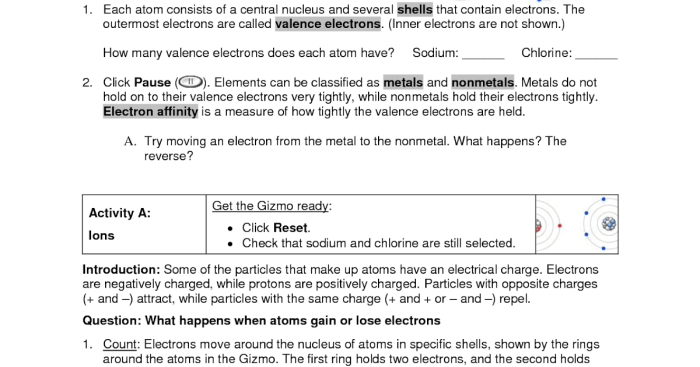The Student Exploration: Ionic Bonds Answer Key provides a comprehensive guide for students to explore the fundamental concepts of ionic bonds. This engaging resource offers a variety of hands-on activities, virtual simulations, and group projects that foster a deep understanding of ionic bonding.
Through hands-on exploration, students can visualize the formation and properties of ionic bonds, leading to a more profound comprehension of chemical reactions and bonding principles.
1. Introduction
Student exploration is a valuable approach in teaching ionic bonds, as it allows students to actively engage with the concept and develop a deeper understanding through hands-on experiences and investigations.
By exploring ionic bonds through various activities, students can observe the properties and behaviors of ions, gain insights into the formation and stability of ionic compounds, and develop critical thinking and problem-solving skills.
2. Types of Student Exploration Activities

Hands-on Activities
- Dissolving ionic compounds in water and testing their conductivity
- Building models of ionic compounds using physical materials
- Observing the formation of ionic crystals under a microscope
Virtual Simulations and Online Resources
- Interactive simulations that allow students to manipulate ions and observe their interactions
- Virtual labs that provide safe and accessible environments for students to conduct experiments
- Online databases and resources that offer information and data on ionic bonds
Group Projects and Experiments
- Designing and conducting experiments to investigate the factors affecting ionic bond strength
- Creating presentations or posters to share their findings and insights
- Collaborating on group projects to build models or conduct research on ionic compounds
3. Benefits of Student Exploration: Student Exploration: Ionic Bonds Answer Key
Student exploration of ionic bonds offers numerous benefits for students’ understanding and learning.
Enhanced Engagement and Retention
Hands-on activities and interactive simulations make learning more engaging and memorable, allowing students to connect with the material on a deeper level.
Critical Thinking and Problem-Solving
Exploration activities encourage students to ask questions, analyze data, and develop their own conclusions, fostering critical thinking and problem-solving skills.
Real-World Applications
By exploring the properties and applications of ionic compounds, students gain a better understanding of their importance in everyday life and various industries.
4. Challenges and Considerations
Safety Concerns
Handling chemicals and materials used in ionic bond experiments requires careful supervision and adherence to safety protocols.
Classroom Management
Group activities and hands-on exploration may require effective classroom management strategies to ensure student engagement and minimize disruptions.
Differentiation
Providing differentiated instruction is crucial to meet the diverse learning needs of students, ensuring that all students can participate and benefit from exploration activities.
5. Assessment and Evaluation
Formative Assessment
- Observations of student participation and engagement during exploration activities
- Analysis of student questions, discussions, and group interactions
- Informal quizzes or exit tickets to assess understanding
Summative Assessment, Student exploration: ionic bonds answer key
- Lab reports or project presentations to evaluate student learning outcomes
- Written exams or quizzes to assess conceptual understanding
- Portfolios or collections of student work to demonstrate progress and growth
User Queries
What is the purpose of the Student Exploration: Ionic Bonds Answer Key?
The answer key provides a comprehensive guide for students to explore the concepts of ionic bonds through hands-on activities, virtual simulations, and group projects.
How does student exploration benefit understanding of ionic bonds?
Exploration enhances student engagement, fosters critical thinking, and develops problem-solving skills, leading to a deeper comprehension of ionic bonding.